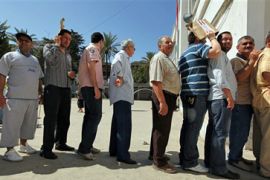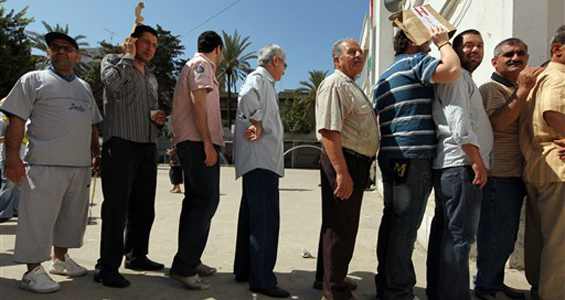Why Lebanon should join WTO
How membership of the WTO could spur stability in the Middle East.

 |
| World powers fail to understand the economic realities of the Middle East conflict [AFP] |
Mike Pullen, a partner and head of international trade at commercial law firm DLA Piper, explains how Lebanese membership of the World Trade Organisation could be an important catalyst for stability and prosperity in the region.
At the beginning of June, the United Nations security council adopted a presidential statement stressing the urgency of reaching comprehensive peace in the Middle East and calling for “vigorous diplomatic action” by all parties concerned.
This was yet another effort by the international community to restart the peace process talks.
Unfortunately, if recent history is anything to go by, this statement, like most of the international talks, decisions and promises that precede it, is unlikely to deliver tangible, lasting results.
The problem is that politicians and diplomats are routinely failing to consider all the pieces of this complex jigsaw puzzle. One important element that is all too often sidelined is the region’s economic aspirations, central to which is the desire of countries such as Lebanon, Syria and Palestine to join the World Trade Organisation (WTO).
Lasting peace
The realisation of a comprehensive, fair and lasting peace in the Middle East lies in the settlement of all relevant issues in the region.
The recent appointment of new administrations in the US and Israel and the elections in Lebanon and Iran may help to breathe new life into the Palestine-Israel talks, which are of course central to the conflict, and the Syria-Israel and Lebanon-Israel negotiations, which are also of critical importance.
But it is the economic realities of the Middle East conflict that the international community has routinely failed to understand and is, perhaps ironically, best placed to address.
It is widely accepted that economic development and regional integration were key to achieving peace in Europe after the second world war. If the international community wants to make a real difference in the Middle East, it should encourage prosperity in the region by enabling Lebanon and its neighbours to join the WTO.
The benefits of WTO membership stem from the cumulative impact of the hundreds of legislative, policy and institutional changes that countries make in order to join.
Those reforms provide applicant countries with an operating system that’s ready to be integrated into the global economic system.
Membership of the WTO serves to discipline governments in their dealings with the private sector, and, since WTO commitments are binding, creates a more predictable, secure and enticing business environment for internal and external investors alike.
The economic benefits of membership are well documented.
Economic benefits
In Saudi Arabia, the extensive process of legal and institutional reforms that took place in the 10 years preceding the country’s WTO accession in 2005 stimulated record GDP growth rates and huge increases in international trade and investment.
There is no denying that stimulus of this kind would be of enormous benefit to Lebanon. A country full of promise at the end of a 15-year civil war in 1990, it is now being ravaged by the Hezbollah-Israel conflict that began in 2006.
Today, the once prosperous nation is struggling to rebuild while saddled with debts of around $47 billion, which is the highest rate of national debt to GDP in the world (180 per cent).
WTO membership would provide Lebanese businesses and consumers with a broader range of competitively priced goods and services, and also enabled them to benefit from greater competition and much-needed investment in the local market.
Such investment would stimulate innovation and the more efficient allocation of capital throughout the economy.
Given the reciprocal nature of the WTO, membership would also benefit Lebanese exporters who would be subject to fewer export and investment restrictions and have a more stable and secure business environment in which to operate.
This would be safeguarded by access to the WTO’s dispute settlement system, which can provide an effective means for resolving trade-related disputes that cannot be settled through normal commercial and diplomatic channels.
Despite the considerable internal and external challenges Lebanon has faced since July 2006, its government has continued to pursue the prize of WTO membership it first sought in 1998.
Significant progress
Indeed, even in the face of a notable decline in productive capacity and economic growth, Lebanon has pushed an ambitious legislative and administrative reform agenda.
Significant progress has been made to restructure the telecommunications, utilities, transportation and manufacturing sectors.
Further, while the Lebanese parliament experienced an 18-month operational hiatus between late 2006 and May 2008, government officials have continued to draft WTO-compatible legislation concerning issues ranging from food safety and quarantine arrangements to the protection of intellectual property rights and competition policy.
Much of this legislation will be enacted in September of this year. And, irrespective of the outcome of Lebanon’s June 7 general elections, this legislative and administrative reform programme is likely to continue as it is supported by the incumbent March 14 coalition and the Free Patriotic Movement, Amal and Hezbollah, the coalition’s main opponents.
The international community should recognise Lebanon’s unique position and the enormous commitment and resilience its people have shown in the face of adversity by expediting the country’s WTO accession.
Such a move would send a powerful signal to others in the region, and perhaps, spark a domino effect that would encourage the accessions of other fragile states, such as Syria and Palestine, also.
In time, it would be hoped that the levels of economic prosperity that history tells us are more conducive to peace would be stimulated in the region.
The opinions expressed in this article are the author’s own and do not necessarily reflect Al Jazeera’s editorial policy.